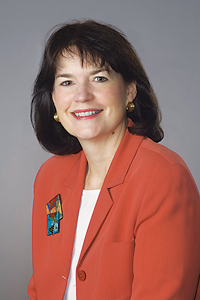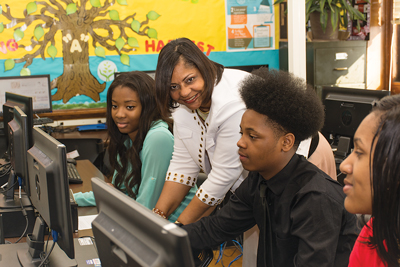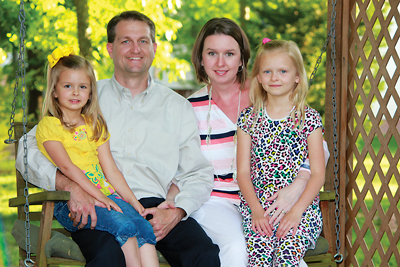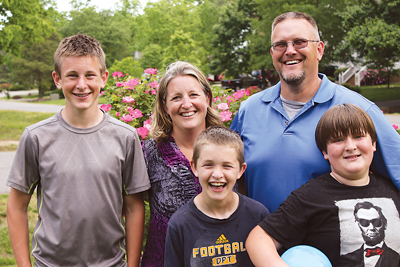Personal debt is deep-sixing college degrees at an alarming rate according to a study by Teenage Research Unlimited, as more students drop out of higher education not because of failing grades, but failing finances. The Virginia Board of Education is helping to reverse this trend, requiring all high school graduates to take a full year of economics and personal finance.
“Mandating this course was a combined endeavor between the Board of Education, Virginia Council on Economic Education, and the financial services industry,” says Sarah Hopkins Finley, director of programs for the VCEE. Largely in response to the recession, the econ and finance course was implemented in 2011, making the class of 2015 the first graduating class armed with a new level of financial know-how.
Part of the curriculum in over 90 percent of Virginia’s public high schools, the class is offered through EverFi and concludes with optional financial certification testing. Alice Wagner of EverFi says that while less than half of the country’s schools require financial education, Virginia is one of the most successful states. “Our team trains and supports teachers as they go through the program,” she says, adding that with the help of thirteen local community financial institutions, close to 7,000 students have been reached this school year in Richmond City and surrounding counties.

The effort to educate has paid off, as twenty-nine Virginia high schools scored in the top hundred for the 2014 school year. What’s more, according to a recent WalletHub study, Virginia ranks among the top ten states for financial literacy.
Roberta Aigbokhaevbo, personal finance teacher at Thomas Jefferson High School in Richmond, says she’s not surprised. “Both kids and parents alike learn from the class,” she says, adding that the course provides opportunities for frequent, productive communication between parents and their children, achieving the ultimate goal to transfer financial conversations from the classroom to the living room.
Curriculum that Communicates

When it comes to raising financially savvy kids, clear communication at school and at home is crucial, says Rachel Cruze, co-author of Smart Money, Smart Kids and daughter of Financial Peace University (FPU) founder and author Dave Ramsey. Cruze says one way parents can do that is to make it the norm that college-bound kids can only attend schools their parents can afford. “No other options besides state schools – that’s how our parents painted it in every college conversation, even though by then they could afford to send us elsewhere.”
The high school economics course helps foster communication by seeking to give kids and parents an understanding of college costs and answering the question: Can my career choice support my college choice? “We do a career research project in which the kids choose a particular college that offers their preferred major and they learn about all the expenses that are associated with it,” says Aigbokhaevbo. Students take a long look at the college experience and answer questions such as, Will I be able to pay the loan back? and How long will it take? “Parents get involved and often tell me they wish they had this class when they were growing up,” she says. “It’s a good dose of reality, but at the same time, we make it fun and relevant and help them to understand so they can avoid the pitfalls that perhaps their parents wish they knew.”
Modeling Money Management
Cruze says her parents modeled daily doses of financial wisdom during her formative years through their lifestyle. “My parents went bankrupt when I was six months old, so I grew up watching them shopping consignment, skipping vacation, and trying to keep the lights on.”
Even after the family’s finances grew stronger, fiscal education remained the norm for Cruze into her teen years, as her father even offered a matching savings plan he called the 401Dave. “401Dave meant whatever money we saved for a car, he would match it,” says Cruze, adding that she saved $8,000 and eagerly took ownership of her car worth twice that as a 16-year-old. “It was mine, I had worked for it, and it showed in the way I took care of it versus the way my friends took care of their cars that had just been given to them.”
Midlothian parents of three, Ed and Anna Beth Kozusko, also implement the matching plan at their house and have seen good results. “Our oldest son, Tad, is thirteen and very forward thinking and motivated; he caught the vision of working toward a goal early on,” says Anna Beth, adding that regular budget discussions around the dinner table from the time they are very young has also helped her boys understand keeping expenses under income.
No Work, No Pay
The association of work with pay is another essential according to Cruze, who encourages parents to make it the norm. “Adjust it to your financial situation, but send the steady message to your kids that money and working go together,” she says, adding that one way her parents did this was to swap the term allowance for commission. “My parents sent very clear signals when it came to money – no work, no pay was the rule in our home.”
Chesterfield mom of two, Alicia Newman agrees. “The biggest thing that we’ve done is to regularly tell them no when they want stuff,” she says, adding that it might sound simple, but it is challenging in this culture. “We often remind them and attempt to explain to them how many hours Daddy has to spend working to pay for, say, that trip to Disney.”

Newman finds assigned chores to be an effective way to teach her young daughters, Emily, 8, and Sarah, 5, the concept of work and pay. “From the time they were walking we began to explain money by providing piggy banks and assigning each of them chores.” Newman says taking her girls to the dollar store to buy a toy with the money they earned themselves is a great way to teach both responsibility and stewardship. “A nickel per chore is not much but they are so young that it works for now.”
Although Kuzusko takes a different approach with her three sons who range from preteen to teen, she has also found the No Work, No Pay mantra gets results. “We don’t do allowance and we don’t give them money unless they earn it,” she says, “so they are always looking for opportunities.” Consequently, says Kuzusko, the standard has compelled her three boys to find ways to earn money elsewhere. Last year, in fact, their 11-year-old, Andy, took a great interest in selling homemade birdhouses, cross necklaces, and cookies at the Powhatan Farmer’s Market, and he plans to return this summer. “They require a class where kids learn how to sell, price, and market their own products, and it really has sparked his interest in entrepreneurship,” said Kuzusko.
What’s more, during the recent snowy winter, all three boys took initiative, grabbing snow shovels and spending the weather-imposed week off from school knocking on doors to find customers. “I didn’t tell them to go shovel; it was their own idea, their own ingenuity,” she says, emphasizing that she doesn’t create new jobs at home in order for her kids to earn money. Additionally, the boys also started their own lawn business since the grass cutting at home is only up for grabs once a week for a short season.
The standard of no work, no pay has had a positive effect at the Kuzusko house. “We are limited and we let them know that,” their mom says, “and because of this they are learning to earn their own way.”
For the parents of kids who aren’t so inclined, Cruze urges consequences, control, and the gift of guidance. “Step in and be the parent, push them a little; sports and a social life are okay, but they need to work, too,” she says, adding that parents are obligated not only to raise good kids, but also good adults. “Parents who allow a daily overdose of screen time when what kids need is life skills will eventually find they are not doing their kids or themselves any favors.”
Delayed Gratification
Another unmistakable message instilled by Cruze’s parents was that money is not a bad thing, but can very quickly become master if you aren’t careful. Cruze, who travels and speaks with her father, says she grew up on the envelope system.
“My parents had a category for everything: clothes, groceries, eating out, and when the designated envelope was empty, the spending stopped.”
FPU offers its own version, along with plenty of other tools to assist parents in training their kids. Financial Peace Junior, for instance, helps kids get organized with commission worksheets along with six books that follow Junior’s adventures in which he learns about work, giving, saving, spending, and integrity.
But extensive tools aren’t always necessary for raising money-wise kids. Newman and her husband, Kris, who is an FPU instructor at his church, look for chances to grab those teaching moments that will instill lifelong financial know-how into their daughters, Emily and Sarah.
When the sisters each won a $25 gift card in an art contest, for instance, their parents took the time to teach them about price comparison. “We checked the local box stores, but found what they wanted cheaper at Amazon, and took the opportunity to tell them if they held off a few days to wait for the items to ship, they would each have five dollars left over for their piggy banks.”

“It is important to teach kids about delaying the satisfaction that comes with buying something you want; that they don’t have to have something just because they see it, but to pause and ask ‘Do I want it? Do I need it?’” Providing ample opportunities to practice delayed gratification helps kids learn the value of patience in their purchases. “I hope it serves them well their whole lives,” says Newman.
Just getting kids tuned into the habit of making wise money choices is a huge step toward a successful financial future. “Kris listens to The Dave Ramsey Show on Sunday mornings, and the girls really do pay attention,” she says, adding that during a recent broadcast one of her daughters chimed in with, “Daddy, that wasn’t a very smart thing for that person to do, was it?”
The now-required finance course for teens has no lack of resources to keep Virginia students skills smart, as well. Group projects that teach about the stock market, credit cards, checking accounts, and even dissect the financial crisis of 2008 are all part of the curriculum. “We are finding that many teens don’t know how to balance their checkbooks or even write a check,” says Aigbokhaevbo, adding that the modules also cover savings, mobile banking, and interest rates.
At the end of every year-long course, students are tested and some schools host certification ceremonies with parents. With a 100 percent pass rate, Aigbokhaevbo was overjoyed. “It is gratifying to see the seeds you have sown producing the harvest and knowing you have impacted the world one student at a time.” For Aigbokhaevbo, teaching students the life skills they need is a way of giving back.
Giving Back
And kids should be compelled to do the same. “There is one more ingredient to raising financially fit kids, and it might come as a surprise,” says Cruze. “Giving is crucial because it gets kids’ focus off of themselves.”
Newman agrees. “Giving helps my girls see that not everything they get is for them. In fact,” she adds, “Emily recently asked for a piggy bank that is divided into three sections: save, spend and give.”
Kozusko and her husband, Ed, also require their three boys to give back. “We teach them to give, but let them choose where it goes,” she says. Thus far, the Kozusko boys have chosen to give to local organizations like FeedMore, and Churchill Activities and Tutoring (CHAT), a group in Churchill whose motto is: Open Homes, Transform Lives, and Rebuild Community.
But why teach kids to give when you’re trying to teach them to save? “Giving instills gratitude; it brings contentment which fosters humility, and it’s very challenging to get that sense [of contentment] until you are giving,” says Cruze, adding that perhaps C.S. Lewis offers the best perspective on giving: “It is not thinking less of yourself, but thinking of yourself less.”

Rachel’s Top Three
I asked Rachel Cruze, who coauthored the book, Smart Money, Smart Kids, with her dad, Dave Ramsey, the top three things parents should focus on to raise fiscally fit kids.
1. Teach them where money comes from. “Teach your kids to work and that if they don’t work, they don’t get paid.” If they know where it comes from, it changes their perspective.
2. Teach them to give. It’s very important to teach kids to look beyond themselves. When they are giving, they are learning selflessness.
3. Be a role model. You’re not going to be perfect, but you are the example. Remember, money habits are more caught than taught – and you don’t lose parent cards just because you make mistakes.




